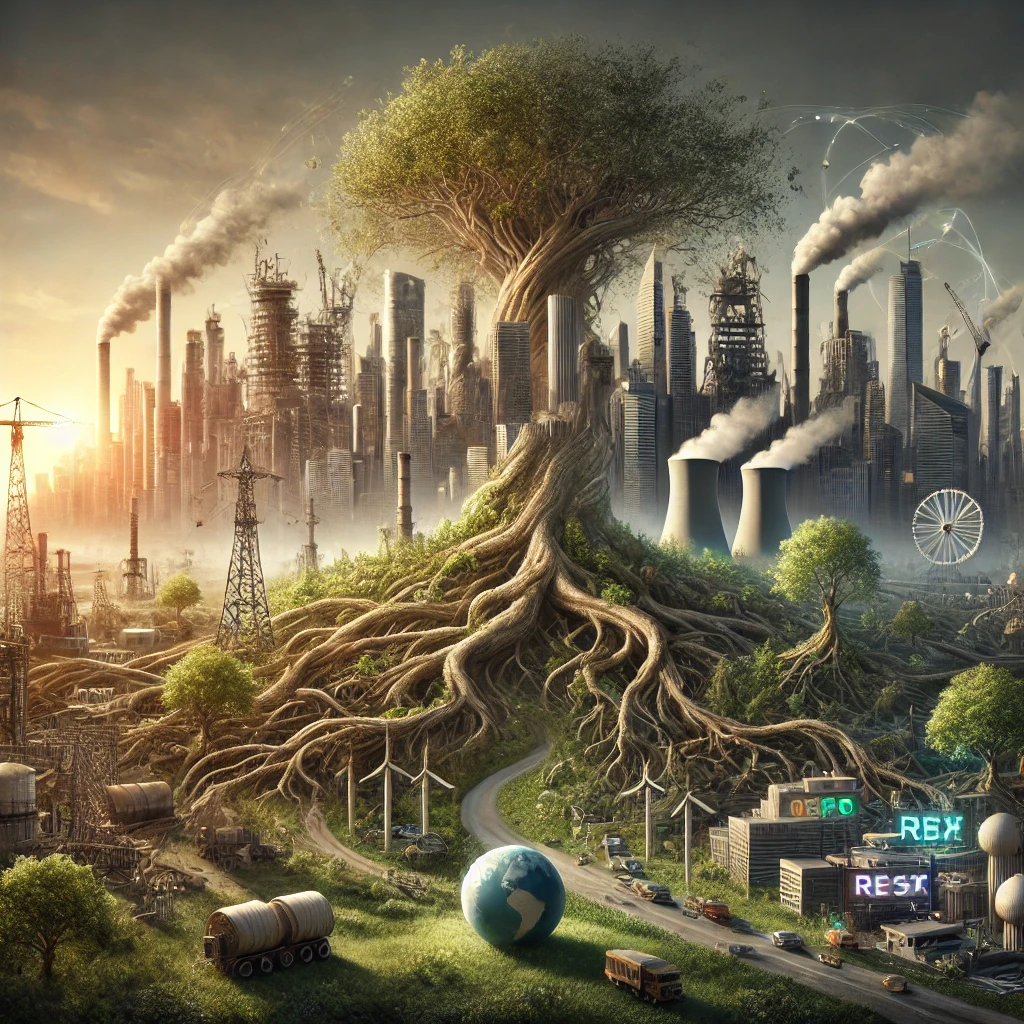In today’s world, we are confronted with a cascade of interlinked crises—a polycrisis. From climate disasters to economic inequalities, political unrest, and the erosion of democratic values, these challenges expose the deep flaws within our current economic system: capitalism. The dominant forms of capitalism—whether neoliberal, state-driven, or socially inclusive—are proving inadequate in addressing the overlapping emergencies we face. This complex web of crises is rooted in the very structures that underpin modern capitalism, and any attempt to transform them requires a systemic, deliberate approach. But what form should that change take?
One possible direction is the concept of real utopias—alternatives that stretch our imagination toward better futures, grounded in feasible frameworks for change. However, as inspiring as these visions may be, they must contend with a fundamental reality: the entrenched inertia of our institutions and societal habits. In this context, inertial change—a slow but steady transformation—proves to be a superior pathway compared to rapid, radical overhauls.
The Nature of the Polycrisis
A polycrisis is not just a series of simultaneous problems. It is the interaction of these crises that amplify and entrench one another, making them more difficult to resolve. The environmental collapse worsens inequality, which in turn leads to political instability, which then undermines effective governance and hinders our capacity to mitigate environmental damage. This feedback loop creates a system in which change feels nearly impossible.
At the heart of these crises is capitalism itself. Rooted in continuous growth, market competition, and profit maximization, capitalism has a built-in mechanism that encourages short-term gains over long-term sustainability. Its current form is one of hyper-capitalism: financial markets drive economies, wealth inequality spirals out of control, and the exploitation of natural resources accelerates.
Real Utopias as Pathways Forward
Real utopias, as proposed by sociologist Erik Olin Wright, offer grounded visions for alternatives to capitalist structures. These are not abstract, impossible dreams, but pragmatic proposals for building more egalitarian, sustainable, and democratic systems within and beyond capitalism. Worker cooperatives, basic income experiments, participatory budgeting, and community land trusts are examples of real utopias that already exist in various forms.
But here lies the challenge: the scale and intensity of our crises require sweeping changes, while the power structures and cultural norms that sustain capitalism are deeply embedded. This leads us to a critical question: how can we move from the localized success of real utopias to systemic transformation without triggering more chaos or a backlash that reinforces the status quo?
Why Inertial Change is the Superior Path
Inertial change refers to a gradual, almost imperceptible shift in societal systems that accumulate over time, rather than a revolutionary upheaval. While some may argue that rapid, disruptive change is necessary to combat the urgency of our crises, history shows that such attempts often lead to unintended consequences—instability, resistance, or the entrenchment of reactionary forces.
By contrast, inertial change leverages the weight of existing institutions and cultural habits to slowly reorient them toward more sustainable, just outcomes. This process harnesses the inertia of our current systems—their inherent resistance to change—to avoid the pitfalls of instability. Instead of attempting to dismantle capitalism overnight, inertial change offers a strategy for transforming it from within, creating fissures that, over time, weaken its most destructive elements.
Real utopias play a crucial role in this process. They provide tangible models of what is possible within our current constraints, planting the seeds of transformation in familiar soil. Worker cooperatives, for example, operate within market economies yet offer a more democratic and equitable way of organizing labor and capital. As these models proliferate and prove successful, they challenge the normative assumptions of capitalism, showing that alternative ways of organizing production and distribution are both viable and desirable.
The Power of Real Utopias in Inertial Change
Real utopias contribute to inertial change in several ways:
- Institutional Experimentation: By embedding alternatives within the existing capitalist framework, real utopias act as laboratories for institutional change. These experiments create data, experiences, and stories that can be scaled and replicated, providing a roadmap for broader systemic shifts.
- Cultural Transformation: Real utopias slowly reshape cultural expectations and social norms. When people experience more democratic and egalitarian institutions—such as cooperative workplaces or participatory governance models—they begin to expect similar values in other areas of life. This cultural shift is crucial for undermining capitalism’s dominance.
- Political Mobilization: Inertial change allows for a more organized, sustained political mobilization. Rather than overwhelming the system with demands for radical change, which often leads to reactionary politics, inertial change creates space for long-term organizing, coalition-building, and policy reforms that gradually erode the power of capitalist structures.
Conclusion: Embracing the Slow Path to Transformation
In times of polycrisis, the allure of quick fixes and revolutionary change is understandable. But the interlocking nature of today’s crises requires a more nuanced approach—one that balances the urgency of our challenges with the need for stable, sustainable transformation. Real utopias provide the vision and models for what is possible, while inertial change offers a path to achieve these alternatives without triggering further chaos.
As we confront the profound challenges of our time, the slow path may very well be the surest way forward. Capitalism, entrenched as it is, will not disappear overnight. But by nurturing real utopias and embracing the inertia of gradual change, we can begin the slow, steady work of transforming capitalism from within—into something more humane, just, and sustainable.

